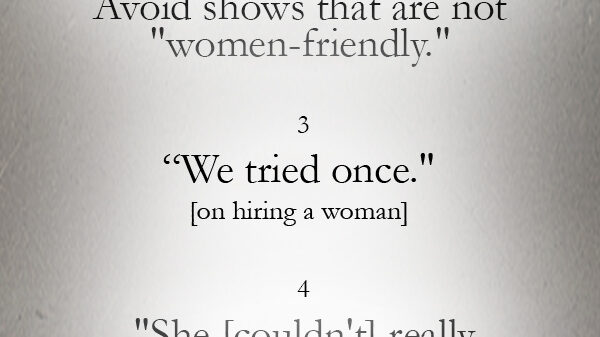The following was originally published on the ACLU Nationwide blog and co-authored by Gillian Thomas, senior staff attorney of the ACLU Women's Rights Project.
This week, Deadline reported that the U.S. Equal Employment Opportunity Commission is in negotiations with the major movie studios to settle agency charges of systemic sex discrimination against women directors.
The EEOC began a wide-ranging investigation of Hollywood’s hiring practices in 2015 after the ACLU and ACLU of Southern California notified the agency of evidence we had gathered showing that sex discrimination against women directors was “standard operating procedure” among movie studios and television networks. Since that time, momentum has been building in the industry, and among the public, for greater opportunities for women directors — most recently under the Twitter hashtag “#OscarsSoMale.”
The EEOC is not permitted by law to comment on pending investigations, so it isn’t possible for us to independently confirm the Deadline piece. But we have no reason to doubt its veracity. And the story is bolstered by another recent article concerning contract negotiations between the major studios and networks and the Directors Guild of America.
According to the report, industry representatives reportedly rejected a contract provision that would have required them to interview female candidates and candidates of color for every director job — an application of the “Rooney Rule” used by the National Football League to increase racial diversity among senior coaching jobs. The studios and networks reportedly cited “legal reasons” for refusing to accept the proposal — further proof they may already be contemplating such affirmative measures as part of an EEOC settlement.
We are elated that the EEOC may have done precisely what we asked of it: used its authority as the government agency charged with enforcing the nation’s anti-discrimination laws to hold the major studios accountable for sex discrimination against women directors. Moreover, settlement of those charges will result in tangible change in the studios’ hiring practices — with continuing federal oversight that will assure compliance — so that women will finally have equal opportunities to sit in the director’s chair.
Such opportunities, in turn, will provide women with the “bully pulpit” needed to tell the diverse stories that audiences have shown, again and again, they want to see. And, if those settlement negotiations fail against any or all of the studios, the EEOC can bring a lawsuit in court in order to force those changes in hiring practices.
Dozens of women directors entrusted the ACLU with their stories of being shut out of their chosen careers, and we are honored to have played a part in potentially winning them some measure of hope for the future. The recent success of prominent female directors like Ava DuVernay is heartening, but it’s still the rare exception to the rule.
The vast majority of women directors still can’t get a foot in the door. In fact, one recent study showed that the percentage of women directing movies in 2016 fell by nearly 50 percent from the 2015 number, all the way down to the same percentage as in 2007. And even if a female director does get hired, research shows she’s much less likely than a male director to get hired again.
The ACLU and ACLU of Southern California will continue to monitor this story and publish additional information as we learn it.


